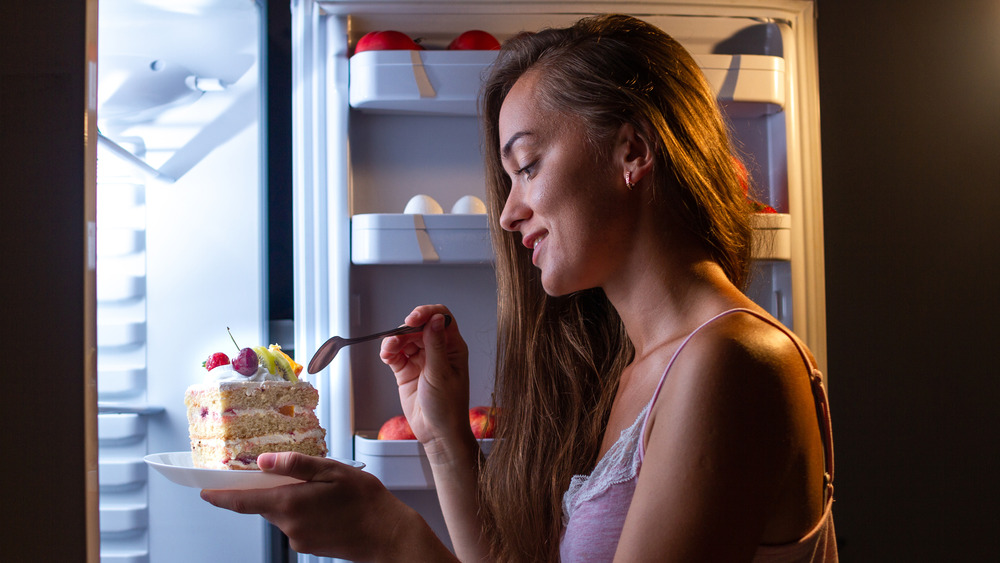The Reason Snacking At Night Could Hurt Your Workday
Many factors affect your work performance, from your previous experience to how well you get along with co-workers to the time of day. Now, a study published in the Journal of Applied Psychology adds another to the list — what you snack on the night before work.
Yes, it's true. Munching on something considered "junk food" affects how you'll behave at work the next day, according to researchers at North Carolina State University.
In their study, the researchers asked 97 full-time employees a series of questions three times a day over a period of 10 workdays. In the morning, the participants answered questions about their physical and emotional well-being. After work, the questions focused on what the participants did at work. And the third series of questions, posed in the evening, related to the participants' eating and drinking behaviors after work, according to ScienceDaily. The last series of questions asked participants whether or not they had indulged in "unhealthy eating," which was defined as eating too much junk food, having too many late-night snacks, or eating or drinking too much overall.
The effect of late-night snacking on the next workday
Seonghee Cho, the corresponding author of the study and an assistant professor of psychology at North Carolina State University, says that no one had previously looked at the short-term effects of unhealthy eating on work performance (per ScienceDaily). So in this study, the researchers attempted to answer whether unhealthy eating affects people at work the next day and, if it does, why.
The study found that when the participants reported having indulged in "unhealthy eating" the night before, they experienced physical problems such as headaches, stomachaches, and diarrhea the next morning. Additionally, they experienced emotional difficulties, such as shame and guilt about their eating behaviors. Both those physical and emotional strains affected how the participants behaved at work throughout the day.
Specifically, the participants noted a decline in their "helping behavior," which might be assisting a co-worker with their responsibilities, and an increase in their "withdrawal behavior," which refers to avoiding work-related situations.
Should you banish late-night snacking?
The study also revealed an interesting tidbit in that people who had higher "emotional stability" (i.e., less emotional volatility) experienced fewer physical symptoms and negative emotions the next day, therefore moderating the connection between unhealthy eating behavior and work-related challenges.
If you do, however, notice that you're kind of a real-life Dwight Schrute after having had a late-night snack, should you banish before-bed snacking, especially of the unhealthy kind, altogether? Well, it may be a little difficult, at least right now. Snacking has risen 27 percent during the COVID-19 pandemic, according to one study, possibly due to people being home and having access to food all day as well as trying to self-medicate with comfort foods as a way to overcome anxiety and stress (per The Ladders).
Still, you may want to reconsider eating before bed, as your performance at work the next day may not be the only valid reason for cutting out late-night snacking. Researchers have, for decades, noted an association between mealtime and health effects (per Discover). For instance, a 2019 study published in the Journal of Obesity found that, for Japanese women, having a late dinner or bedtime snack was associated with a higher probability of being overweight. Other studies have found eating dinner late at night, no matter what the meal consists of, tends to raise blood-sugar levels more than a regular dinnertime does.
So it may be worth it to end late-night snacking, both for your health and your co-workers' sanity.



